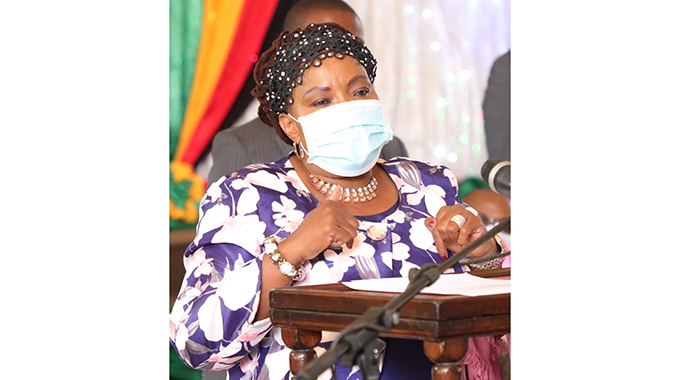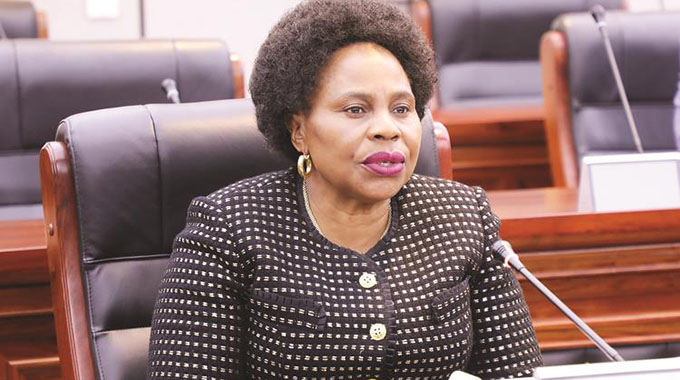First Lady’s Nharirire programme goes a gear up

Tendai Rupapa and Elliot Ziwira
ZIMBABWE continues to lay the foundations for men and women of integrity with unshakable family bonds, courtesy of the Nharirire Programme launched recently by First Lady Auxillia Mnangagwa.
The First Lady is a proponent of family unity and the preservation of the country’s norms and values.
Yesterday’s programme, which was the second one for Harare, was in response to requests for more sessions by guests who attended last week’s educative and highly-interactive session.
The programme will cascade to all the country’s provinces.
It emerged during discussions that some women were in the business of selling drugs to children.
The First Lady said it was prudent for women to engage those who were doing so “woman-to-woman”, and educate them on the dangers of drugs.
As women were going through various topics at Girls High School in Harare, men were doing the same across town at the City Sports Centre under the guidance of experts in various fields.
The women said among the attributes of a perfect woman expected in society, they wanted someone who performed her household chores; one who was organised and smart.
They also said a woman must be a good communicator who was non-violent, not jealous, respectful, content with her life station and has time for her children, among other attributes.
The audience comprised women from all walks of life, churches, businesspeople and members of the community. The First Lady said she would leave no stone unturned through the Nharirire programme.
The programme could not have come at a better time as both children and their parents were doing morally reprehensive things, which prompted the mother of the nation’s intervention.
“This is our final day of meeting as women in Harare Province before I take the programme to other provinces. Today is our day of moulding a woman whom we want in our country.
“Since we started the programme here, the onus is on you to build a mother you want. The same applies to men who are also moulding the man they want. We shall look both sides and meet as men and women where men will give us the men they would have built as women do the same. We shall then juxtapose that to the life we lead today,” she said.
The First Lady said there were attributes that an ideal mother should have, and it was her intention to ensure both men and women knew what was expected of them.
“We shall look at what is expected of a mother and the position of a woman in the family, the stature of a woman in a household. We want to mould the son and daughter we want as a family. In the end, after selecting the woman and man we want, we then want to extricate our children from the menace of taking drugs,” she said.
One of the speakers, Mrs Briggette Matenganzara, a teacher at Girls High School spoke on the attributes of a good mother in terms of etiquette which included dressing, speech and conduct.
“As teachers, when a child is giving us problems, we invite the mother for discussion. But just the dressing by that parent will tell you where the child’s mischief is coming from.
“There is dressing which is ideal for outings with your spouse and for the public and dressing expected of a married woman. If you visit the child’s school wearing ripped jeans or skimpy attire, it says a lot. If as a mother you dress badly, what about the child?”
She also spoke about personal hygiene saying bathing habits should remain consistent as homes are being destroyed because of untidiness. Women should not cease performing laundry duties for their husbands as this would lead them to having extramarital affairs.
“Like what the First Lady said, today we want to build a woman we want in the country,” she said.
So engrossing was yesterday’s session during which Pastor Idah Chikono spoke about the need for women to submit to their spouses.
“A woman was created from Adam’s rib and made a perfect helper. A woman was made a helper and not a ruler who dominates the home. A woman must be submissive and respectful.
“Humble yourself and not walk with a chip above your shoulder because you are more educated than your husband. We want a woman who is submissive and loving to her family,” she said emphatically.
Another lady, Mrs Lillian Chigwiko said she was dismayed because women had lost identity and morals.
Women’s Bank chief executive Mrs Mandas Marikanda spoke about Nharirire yemusha-women who watch over families and fired a lot of thought-provoking questions to make her presentation lively.

One of the women contributes ideas during Nharirire yemusha naAmai in Harare yesterday. — Picture: Memory Mangombe.
“I have questions for you madzimai. What should we do with women who deny their husbands conjugal rights forcing them to have extramarital affairs? What should we do with married women who engage in extramarital affairs?
“Did you acquaint yourself with your husband’s needs and not those of a neighbour? What should we do in raising our children?”
She said women were giving respect to neighbours at the expense of their husbands whom they henpeck.
Mrs Marikanda highlighted that women should give more time to their husbands and enlighten their children on marriage.
“The fear of God is the foundation of the family. Teach children to marry for love and not money. If you see your daughter coming to introduce a guy who is a pedestrian, do not ask whether or not she does not see those with cars. What are you teaching children?
She also touched on women who delegate all household chores to house helps, saying there are certain duties that should not be assigned to housemaids.
“Clean your own bedroom. Some women make maids wash their husbands’ undergarments. Whenever a man enters the bedroom he starts being quizzed about useless things that happened in the past. A bedroom is not a courtroom,” she said.
Bishop Dr Patience Hove who is involved in counselling said it was emerging that most parents did not have time with their children.
“We are leaving children in the hands of house help and gardeners but we have no time to analyse people who are taking care of our children. Because you have no time with your children, even when they are sexually abused you won’t notice.
“As a mother if you bathe your child you will see if there is anything amiss. Know how to screen our maids, drivers or even gardeners because these are the people who will be with our children most of the time.
“Let us also have a good relationship with our house helps. When our children are stressed let them find solace from you, not alcohol and drugs because they mostly rush to drugs because you will be unapproachable,” she said.
Mrs Clara Antipas, a youth advisor and counsellor, described the First Lady’s programme as timely.
“The children I teach tell me that at home their parents only call them in for two things only to be shouted at or to be sent on an errand. They say they are never imparted with the trends of life or cultural norms and values. Now for the mischief to end in children, let us have time with them,” She said.
The First Lady said she was there for everyone and implored women to make use of her Angel of Hope Foundation’s mobile clinic for cancer screening.
At the City Sports Centre, men brought minds together in the search for the ideal father, whose attributes are key in societal cohesion, since society begins at the familial level.
In an interactive engagement, discussants tapped into the rich reservoirs of expertise in the persons of Professor Francis Matambirofa, Professor Mickias Musiyiwa and Sekuru Samuel Gumiso Dhliwayo, who were the facilitators.

A woman makes a contribution during Nharirire yemusha naAmai in the capital yesterday. — Picture: Memory Mangombe.
Cognisant of the adage that it takes a community to raise a child, Prof Matambirofa, reiterated that the First Lady’s Nharirire initiative was born of the desire to mould the complete individual capable of imparting constructive ideas on young people without necessarily taking fathers as children requiring handholding.
Therefore, the sharing of ideas in such an endeavour could not be overemphasised.
The major talking points were: who then should be considered an ideal father and why? How do people know that they are looking at a father?
In the rich exchanges that ensued men agreed that an ideal father should carry the family’s responsibilities on his shoulders as the head. He should be a provider and protective shield to his wife and children and lay all his cards on the table. Discussants were in agreement that respect is earned and commanded because a man’s wife and children are his first vetting port.
Fathers should leave an inheritance for their children and teach them the importance of hard work.
Prof Musiyiwa said a father carries societal burdens because society begins with the family unit. Therefore, a father should endure and sacrifice for his family notwithstanding the challenges that come with fatherhood.
He highlighted that a father is a courageous and brave person, who should not run out of ideas. Should that happen, he should always seek ideas, instead of simply whining as he risks losing out to the woman.
Acting Harare Mayor Councillor Stewart Mutizwa said the First Lady’s Nharirire initiative afforded the country a chance to move forward beginning with the father.
Clr Mutizwa underscored the need to go back to the source where customs of the African people were rooted, saying it took a young tree to be braced up or mended.
The dare (meeting place), he said, was aimed at building a complete man, capable of not only providing for his family through ingenuity and skill, but also loving his wife and performing his conjugal duties satisfactorily.
Fathers should rise to the occasion by inculcating values in their children, as they should not only be seen but heard.
Bishop Solomon Magwani underlined the essence of love in all its variables. An ideal father, he averred, should not only love his wife and children. He should also love his siblings, extended family members and neighbours.
However, men decried lack of supportive policy frameworks to enable them to effectively play their fatherly roles without impediments as the law seems to be in conflict with customs.









Comments